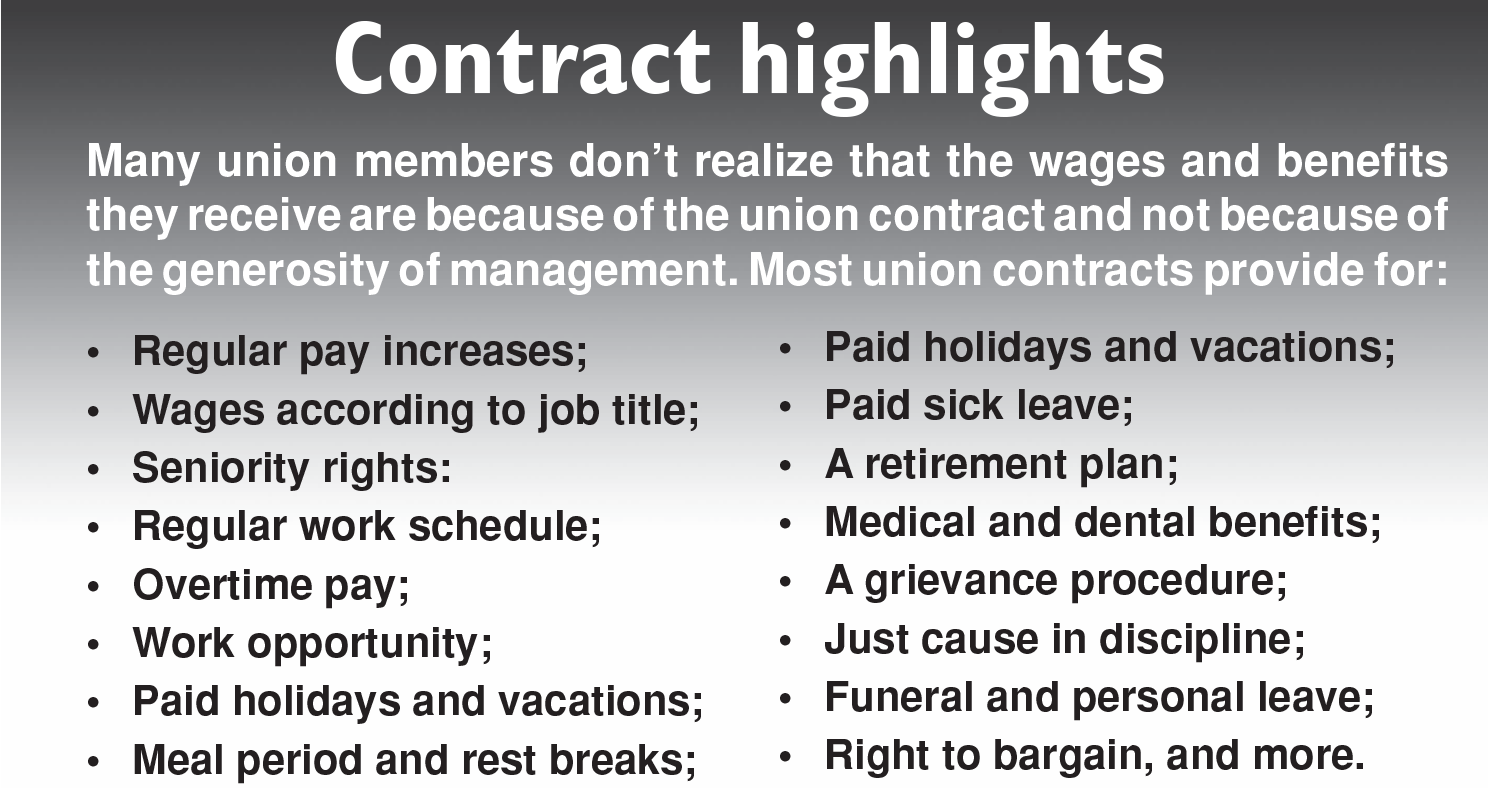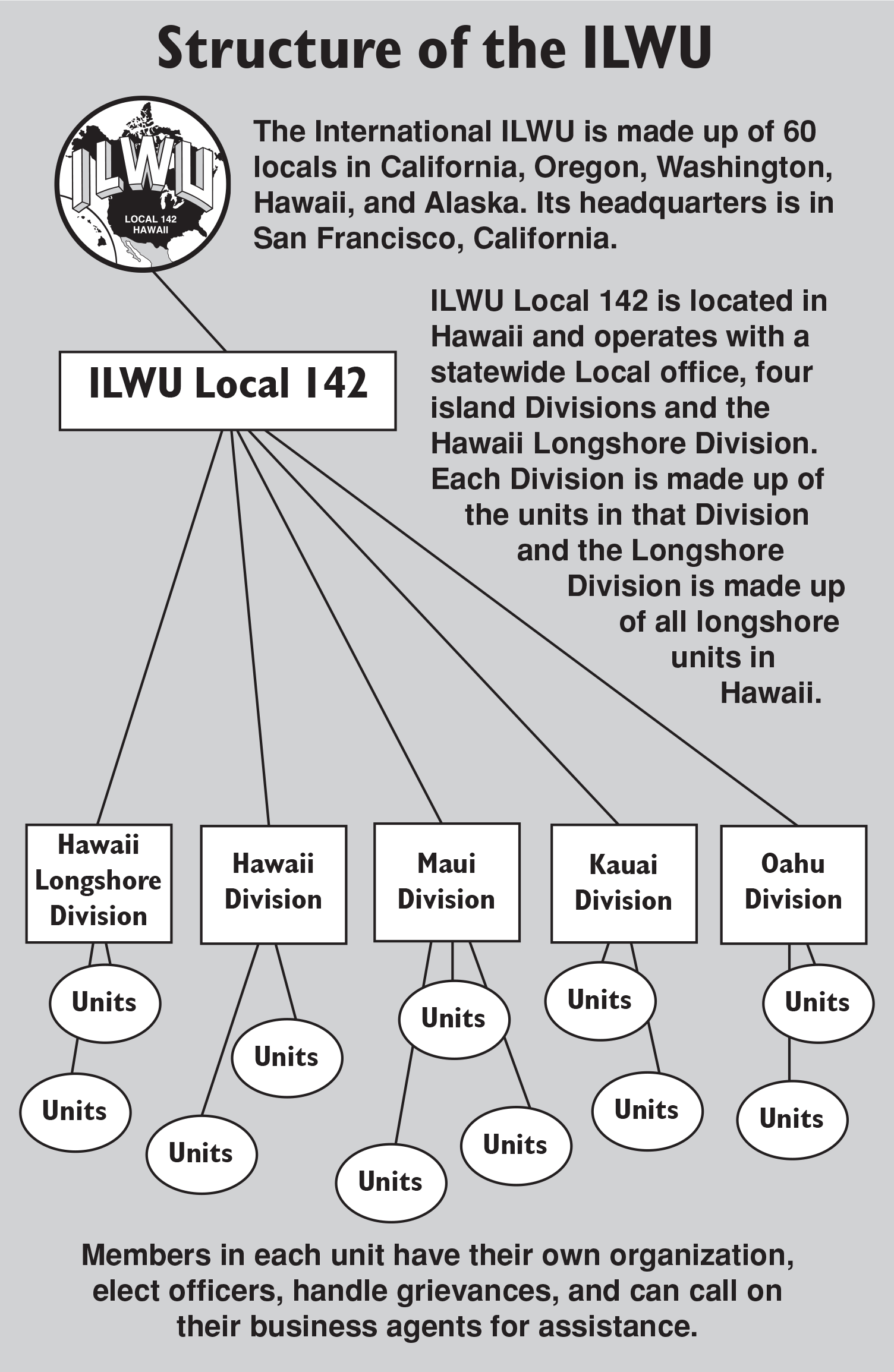Your union contract is a written agreement with your employer. It guarantees your wages, benefits, conditions of employment, and rights. It is enforceable through a grievance procedure and ultimately in a court of law.
The union contract is like a constitution governing union-management relations. Like the constitution it sets forth your rights on the job. The contract is a symbol of the past victories of workers in getting their rights recognized. It is the result of struggles over many years, in which workers got employers to recognize their union, to bargain with the union, and to put the agreement down in writing
In the course of these struggles many workers made great sacrifices. Some of them lost their jobs and were deported. Many went on strike and endured tough times in order that we might enjoy the benefits of the union contract today. Because of them we don’t have to face these hardships.
It is our duty to fight to preserve and improve the union contract. We owe it to ourselves and we owe it to our fellow workers who have pioneered the way for us.
Know your rights
But we can’t obtain our rights under the contract, no matter how good it is, unless we know what those rights are. A lawyer must know something of the law before going to court.
You must know your contract and how it is applied at your workplace before you can successfully handle grievances. In too many cases, stewards learn the provisions of the contract from management, and they learn it too late — after the grievance has been lost.
In explaining the contract to members, you may find that some parts of the contract are weak. We should explain clearly that these parts are weak because they were the best the union could get at the time. But if we all stick together and make the union stronger, we can improve the contract in the next negotiations. Instead of fighting among ourselves and blaming the union for weak sections of the contract, we should realize that the boss, not the union, is responsible for our grievances, and that we must work together to make the union stronger if we want to get a better contract.
We should pick out the best parts of our contract and get every benefit out of them. If we do this we learn what improvements are needed in the next negotiations. We educate our membership to the benefits which come from united action and strengthening our union.
Preparing for negotiations
Most union contracts are renegotiated every three years, although some contracts run for only one year and others run for as long as six years. How long the contract runs is up to you and your negotiating committee.
The ILWU is a democratic union and members are involved in every step of negotiating a new contract.
Months before the old contract expires, the union members at your company will be asked for their input and ideas on what to change in the contract. This is usually done at a membership meeting, called by the officers of your Unit. This is one good reason why you should attend union meetings—it’s your chance to improve your union contract.
Committee of workers
Your unit will also select a committee to represent them in negotiations with management.
This committee is usually composed of your elected unit officers, but many units will expand the committee to make sure different groups or departments in your unit are represented.
A hotel unit, for example, might select a committee with members from different departments such as housekeeping, food and beverage, food preparation, maintenance, and front desk. A local officer, division director or business agent will work with your negotiating committee as your spokesperson.
During negotiations, unit members may be asked to support their committee by wearing union buttons, attending rallies, and mobilizing other activities.
When your committee believes a fair settlement with management has been reached, they must get your vote of approval before the new contract can be finalized.
This happens at a membership meeting where your committee will report on the settlement and where your unit members will vote to accept or reject the settlement.
This is another part of ILWU democracy, which requires membership approval for all contract settlements. In rare cases, management may refuse to agree to a fair settlement and your committee may ask you to authorize a strike. ILWU democracy requires membership approval for a strike.
Your union contract is a very important document. You should read the contract and be familiar with its terms. You can get a copy of your contract from your unit officers or Division Office.

Some facts about the ILWU
There are about 20,000 members in ILWU Local 142 in Hawaii. ILWU members work in many different industries—from memorial parks to hospitals—on all major islands.
ILWU Local 142 is one of 60 ILWU locals which make up International Longshore and Warehouse Union. The International ILWU is affiliated with the National AFL-CIO.
Local 142 is not like other unions which represent workers in a single industry or craft. Local 142 unites workers from many different industries into a single union.
This is a source of strength for the ILWU, as the combined membership makes the ILWU the largest private sector union in Hawaii and the diversity of membership makes the ILWU truly representative of the people of Hawaii.
The largest industry in the ILWU is the tourism industry. Hotels and golf courses make up about half of the our membership. The next largest group of about 1,500 members work in supermarkets.
Hospitals, care homes, and other healthcare related Units have about 1,100 members. Longshore has about 1,000 members. There are 700 members in the auto industry and trucking. Sugar, food manufacturing, pineapple, macadamia and other agriculture industries have a total of about 1,800 members.
Other industries organized by the ILWU include credit unions, power plants, newspapers, and laundries.

